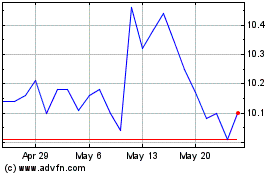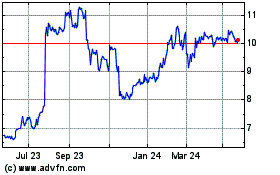WASHINGTON—The Obama administration is preparing to give Iran
limited access to U.S. dollars as part of looser sanctions on
Tehran, according to congressional staff members and a former
American official briefed on the plans.
The proposed move comes amid rising Iranian criticism that the
landmark nuclear agreement reached last year between global powers
and Tehran hasn't provided the country with sufficient economic
benefits.
Executives at European and Asian banks have said in recent
interviews that they remain reluctant to conduct any financial
transactions with Iran due to fears they might run afoul of the
U.S. Treasury and its regulations that ban dollar dealings with
Iranian firms. Most major international trade, particularly in oil
and gas, is conducted in U.S. dollars.
The Treasury is considering how to issue licenses to offshore
dollar clearing houses for specific Iranian financial institutions,
an approach that wouldn't require the involvement of American
banks, according to the congressional officials. The clearing
houses, likely involving select foreign banks, would conduct the
dollar transactions instead, shielding the U.S. financial system
from any direct contact with Iran, these officials said.
"They are looking at a couple mechanisms to allow for this
dollar trade, stopping short of normalizing banking transactions,"
said a congressional banking official briefed by the administration
on its plans, which haven't been finalized.
Treasury action on Iran's access to the dollar wouldn't require
congressional approval.
American law still prohibits U.S. and foreign banks from dealing
in dollars with Iran, despite the July nuclear agreement. The
Treasury Department designates Iran's entire financial system as a
"primary money laundering concern" due to Tehran's nuclear and
missile programs and support for international terrorist groups,
such as Hezbollah in Lebanon and Hamas in the Palestinian
territories.
The U.S. Treasury and State departments declined to comment
Thursday on preparations to allow Iran limited access to
dollars.
But Treasury Secretary Jacob Lew has stressed in recent weeks
the need for the U.S. to comply with the "letter and spirit" of the
nuclear agreement and help Iran gain economic relief. Congressional
officials following the deliberations said they expected a Treasury
action could come within weeks, though they acknowledged details of
the proposal were evolving.
Since 2006, the U.S. government has imposed an escalating
campaign to freeze Iran out of the global banking system in a bid
to persuade Tehran to roll back its nuclear program. The sanctions
crippled Iran's economy and cut by more than half its oil exports.
Under the nuclear agreement Iran consented to limit its nuclear
aspirations in exchange for the lifting of most international
sanctions.
Treasury and State Department officials have traveled to the
Middle East, Europe and Asia in recent weeks to meet with foreign
governments and private businesses to discuss ways to help Iranian
commerce, according to U.S. officials, who didn't address the
proposed dollar arrangement.
On Wednesday, Mr. Lew gave an address on sanctions policy at the
Carnegie Endowment for International Peace, a Washington think
tank, and argued the U.S. risked losing international credibility
if it didn't follow through and provide Iran with significant
relief.
"The risk that sanctions overreach will ultimately drive
business activity away from the U.S. financial system could become
more acute if alternatives to the United States as a center for
financial activity…assume a larger role," Mr. Lew said.
The Treasury chief refused during a March congressional hearing
to answer a lawmaker's questions about whether Iran would be
granted access to the dollar. The administration will "make sure
Iran gets relief," he responded.
Members of Congress from both parties have rapped reports that
the White House is preparing to provide Iran with access to the
U.S. dollar.
Lawmakers argued in letters to the administration this week that
such a step risked undermining U.S. sanctions campaigns around the
world, which are predicated on using the heft of the U.S. financial
system to punish America's adversaries. Iran, they stressed,
continues to support terrorism and is developing ballistic-missile
capabilities, despite moving to scale back its nuclear program.
"I believe this will set bad precedent, and it will not be the
last time the Iranians and/or their business partners receive
additional relief not contemplated" under the nuclear deal, Rep.
Brad Sherman (D., Calif.) wrote President Barack Obama on
Thursday.
In a statement released by his office on Thursday, House Speaker
Paul Ryan said the administration should abandon the dollar-access
idea. "As Iran continues to undermine the spirit of its nuclear
agreement with illicit ballistic missile tests, the Obama
administration is going out of its way to help Tehran reopen for
business," he said in the statement.
Republican Sens. Marco Rubio of Florida and Mark Kirk of
Illinois wrote Mr. Lew on Wednesday seeking assurances that Iran
wouldn't be granted dollar access. Their offices said they haven't
received responses.
"We believe the United States should instead increase pressure
on the Iranian regime in order to hold it fully accountable for its
threatening and destabilizing activities outside the nuclear
realm," the letter from the senators said.
Iran has conducted a string of ballistic-missile tests in recent
months that the Obama administration said were "inconsistent" with
a United Nations Security Council resolution, though it stopped
short of charging Tehran with a violation. U.S. officials also
believe Iran is a major supplier of arms and funding for the Bashar
al-Assad regime in Syria and the Houthi militia in Yemen.
Since the agreement went into force in January, Iran has scaled
back its nuclear activities. The U.S., however, has maintained
penalties on Iranian defense and missile firms and individuals
allegedly involved in human-rights abuses.
Iranian officials have increasingly complained that the ongoing
U.S. penalties are prohibiting Iran from conducting normal business
with a flood of European, Asian and Middle East companies that have
sought to enter the Iranian markets.
Iran's Supreme Leader Ayatollah Ali Khamenei sharply criticized
the Obama administration during a Persian New Year's speech for
allegedly misleading Tehran's nuclear negotiators during the
talks.
"Our banking trade, our efforts to return wealth from their
banks, various kinds of businesses that require financial services,
all of these are still facing problems," Mr. Khamenei said. "When
we investigate the issue, it becomes obvious that [the banks] are
afraid of the United States."
Mr. Lew and other U.S. officials said in the months after the
nuclear agreement that Iran would continue to be denied any access
to the U.S. financial system. This included blocking Iranians from
establishing accounts at American banks or conducting dollar trade
through European or Asian banks.
"Iranian banks will not be able to clear U.S. dollars through
New York, hold correspondent account relationships with U.S.
financial institutions, or enter into financial arrangements with
U.S. banks," Mr. Lew said last summer.
(END) Dow Jones Newswires
March 31, 2016 21:25 ET (01:25 GMT)
Copyright (c) 2016 Dow Jones & Company, Inc.
Pacific Current (ASX:PAC)
Historical Stock Chart
From May 2024 to Jun 2024

Pacific Current (ASX:PAC)
Historical Stock Chart
From Jun 2023 to Jun 2024
